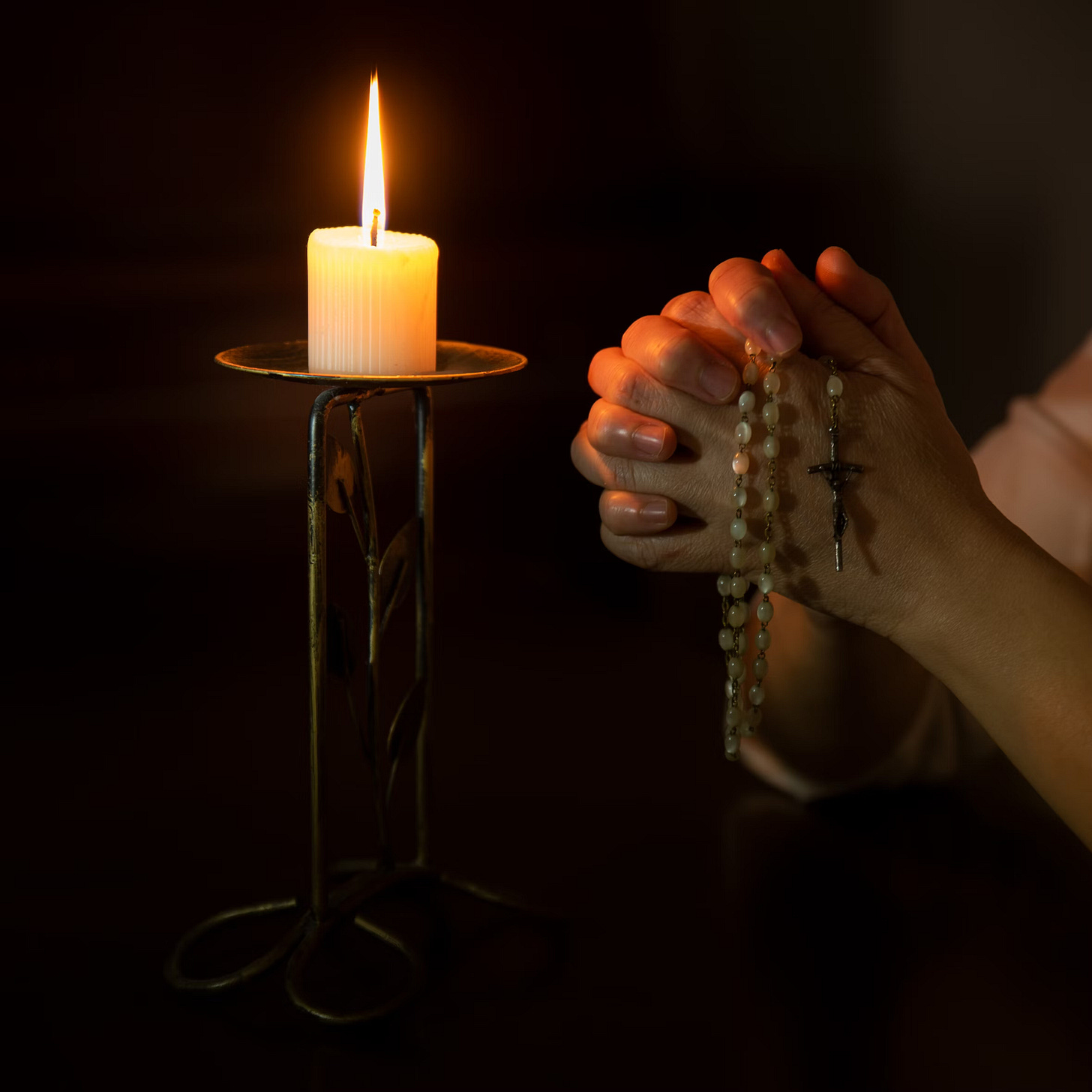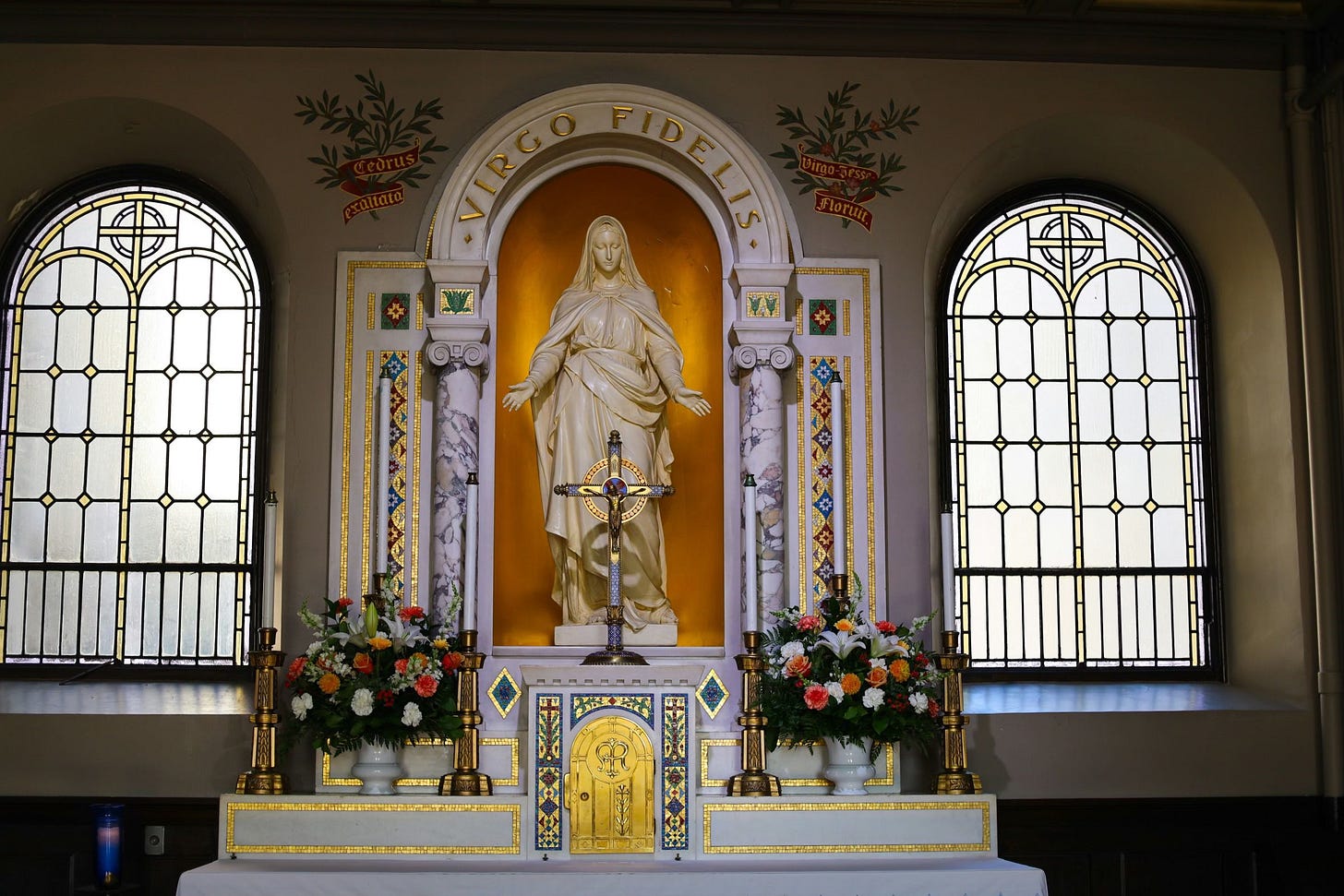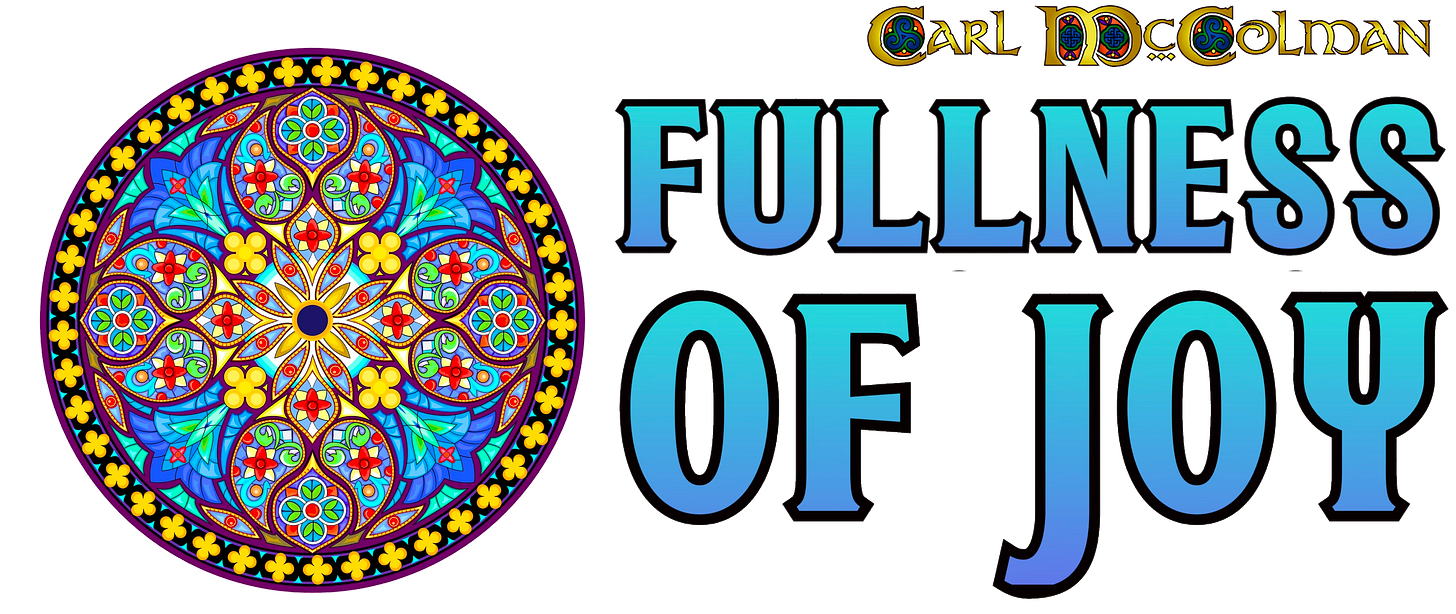The Mystical Path and a Grounded Life
Balancing Spiritual Transcendence with Down-to-Earth Humility
Recently a reader of this newsletter wrote to me:
My best friend is a devoted Catholic, and recently told me was spending some time in mysticism and after a while felt like he needed to "reground" himself so he started praying the rosary again. The rosary holds no meaning for me, so I can't reground with it.
While I’m not quite sure what is meant by “spending some time in mysticism,” I am happy to offer a bit of speculation.
First let’s look at what someone can do to spend time in mystical spirituality, and then we can follow that up with some thoughts on grounding, regrounding, and the Rosary as a spiritual practice. Lots of ground to cover!
How to “spend time in mysticism”
There are many ways we can dive into the treasures of the contemplative life.
Is “spending time in mysticism” simply a matter of personal research, in other words, reading some books or watching some videos about mysticism?
Or is there more of a practical component: does this entail a daily practice of prayer, meditation, and contemplation? If so, what does that practice involve?
What about practices of self-discipline, like fasting? (In my experience, fasting can quickly lead to a sense of feeling ungrounded).
Finally, what role does relationships play in our mystical exploration? I wonder if my reader’s friend has been taking classes from a contemplative or monastic teacher? Is he meeting regularly with a spiritual director? Does he go on retreats, and if so, how frequently? Is he working a particular program, like the Spiritual Exercises of Saint Ignatius?
Clearly, there are many ways to encounter the mystical path and to begin to walk it for ourselves. Some of these could naturally lead more quickly to feeling ungrounded. And without a good spiritual director or community to support us when we dive deep into the mystery, having a sense of being ungrounded is something that can arise.
This is what Ken Wilber likes to call “Aperspectival madness.” If I understand Wilber correctly, what he means by this is a disorienting experience of heightened consciousness that can see truth in a relativistic way, but gets lost in that viewpoint, where all “perspectives” or views seem equally valid and equally meaningful — but can lead then to a sense of isolation and even cynicism (such as the Nietzchean principle “Nothing is true, everything is permitted”) and may result in a person’s inability to separate truth from falsehood altogether.
Keeping Heightened Consciousness Down to Earth
Mystical practices, like extensive periods of silent prayer, long retreats, or even an unyielding spiritual practice anchored in fasting or other forms of self-discipline and denial, can snap us into a place where we can see the world non-dualistically. Without careful guidance or a strong sense of humility (staying down to earth), this experience of the nondual can lead to aperspectival madness. But it also can open a seeker up to a profound experience of pervasive joy and the ability to sense the Divine Presence in all things. At its best, this impels us to love and care for others in a spirit of mercy, compassion and service. But aperspectival madness can lead to solipsism, self-aggrandizement, or even just a kind of self-centered withdrawal from the outside world.
Mystical experience can lead to questioning the religious institutions that previously helped to keep us grounded. Even almost a century ago, Howard Thurman spoke of the rift that can emerge between mystics and their institutional faith communities. If anything, that rift is even wider today, thanks to the widespread breakdown of institutional religion in much of society today. But one of the functions of a community is to help us remain grounded — in relationships, in service to others, in rituals that call us back to the grounding of the sacraments, where water, bread, oil and wine function as the means by which we encounter divine grace.
So I am not surprised that my reader’s Catholic friend had an experience of exploring mysticism and feeling ungrounded; it can happen. I’ll confess that I am a little surprised at the practice he chose for re-grounding; simply because I know that the Rosary can itself be a kind of mystical practice, and that praying the Rosary obsessively or too frequently can also lead to a disorienting sense of being ungrounded.
Integrating a Higher or Different Perspective
I’m only guessing here: but my hunch is that my reader’s friend found that his mystical experiences were leading him to a place where he began to glimpse that God can be accessed by means other than his own church — and that felt too threatening to his ego, so his ego reasserted itself by insisting that he engage in a practice this is very much embedded in his church (in his case, the Catholic Church). If the person had been a Presbyterian or a Baptist instead of being Catholic, he probably would be responded to his mystical experiences by throwing himself into Bible study — since Bible study is to conservative Protestants what praying the Rosary is to conservative Catholics.
There’s nothing wrong with retreating into a spiritual practice that feels safe and predictable, especially after a profound experience of Mystery. Not only does that kind of practice help us to feel grounded, it can also be a way to integrate the wisdom of the mystical experience into our ongoing faith experience. But, there are dangers here, and the biggest danger is falling for the fiction that “my way is the only way” — that only “the church” or (worse) “my church” can truly or reliably help me to meet the Mystery of God. If the retreat into mundane religious practice is done just for the sake of feeling grounded and stable, then it’s good. But if underneath that practice is a kind of spiritual regression that insists there is only one “correct” path to God, that is an unfortunate detour.
Grounded Spirituality and Mysticism Are Not Necessarily Opposed
It seems to me that one of the issues bubbling beneath the surface here is the idea that being mystical and being grounded are somehow opposite experiences. While I certainly understand that some people can approach mysticism from a very transcendentalist perspective, seeing it as a kind of “flight of the alone to the Alone” and therefore a deeply interior and imaginative experience of pure spiritual being that seems to leave the body far behind, I would like to suggest this, in face, is a distortion of mysticism — at least, of mysticism in the Christian tradition. Let me explain.
We live in a culture that has inherited from our Greek ancestors a very dualistic way of understanding the world: a way of seeing the world as divided into matter and spirit. Matter is dense, physical, inert and weighty — but it is also grounding and stabilizing. By contrast, spirit is light (all puns intended), heavenly, dynamic and ethereal, and therefore is the means by which we encounter God, experience love, and ultimately transcend physical death in order to experience eternal life. Speaking of which: matter is temporal: the material experience of time is linear and chronological; and by contrast, spirit is eternal: the spiritual experience of eternity is nonlinear, nonspatial, centered on kairos rather than kronos, which is to say, more embedded in the eternal now rather than the temporal ticking of a cosmic clock. Chronological time is linear and can be measured by clocks (chronometers), whereas eternity is based on kairos, an understanding of time that has nothing to do with a ticking clock and everything to do with what some Christian mystics have called “the sacrament of the present moment.”
I think it’s quite helpful to have an understanding of the distinctions between matter and spirit, or between time and eternity, or between Kronos and Kairos. But we get into trouble when that distinction gets viewed as a kind of unbridgeable gulf: never the twain shall meet. At that point, the matter/spirit distinction collapses into a matter/spirit dualism, which is problematic in both theoretical and practical ways.
The Problem with Dualism
Abstractly speaking, dualism is a problem because it opens the gate to unhelpful value judgments: if we see matter and spirit as implacably separated, then it’s not too far of a stretch before we begin to see one as closer to God than the other, which means that one is good and the other is bad. This is precisely what the long tradition of Greek dualism has bequeathed on western culture: this idea that spirit is closer to God than matter, and therefore spirit is good, heavenly, and (relevant to this discussion) mystical, whereas matter is considered bad, hellish, and inescapably mundane.
But wait — didn’t I just say that matter is stabilizing and grounding? Well, yes, but that’s an understanding of matter before dualism ruins the party. In the dualist view, there is nothing redeemable in matter, just like there is nothing wrong or negative about spirit. Spirit is purely good, so therefore matter must be purely bad.
Oops.
So how does this play out in practical ways? We can see several problems that have emerged. One is that our culture projected a binary and dualistic understanding of gender onto the spirit/matter duality: where male becomes associated with spirit, and female with matter. So men are viewed as more heavenly, more intellectual, more philosophical, and more mystical than women, who are by contrast regarded as sensual, slaves to their appetites, irrational, and handicapped when it comes to spirituality. Hopefully people reading this here in the 21st century will readily see how absurd this is; but if you know the history of western intellectual thought, you also know that this kind of thinking lurks behind the sorry history of the oppression of women.
Corollary to this is the idea that sexuality is material (and therefore feminine), in contrast to spirituality (mysticism) which is regarded as more ethereal and masculine. To put it crudely, men are regarded as pure like angels, women as lecherous like animals. For this reason, women needed to be controlled by the men who had power over them: originally their fathers, eventually their husbands, who had a responsibility to keep them safely hidden away from the world where they would be incapable of controlling their animal lusts (and would be a risk to leading men to temptation, not unlike how Eve caused Adam’s fall).
I cannot stress enough how absurd this kind of thinking is. But unfortunately, it’s part of our intellectual history. Christianity’s long history of discomfort with sexuality and eroticism is caused by the same dualistic philosophy that gave the world the oppression of women — and, for that matter, other forms of oppression like racism and homophobia/transphobia.
Back to My Reader’s Ungrounded Friend
So let’s bring all this to bear on the question of mysticism leaving someone feeling “ungrounded” — like my reader’s friend. It’s certainly not my place to criticize anyone’s spiritual experience, but I can’t help but wonder if this person’s sense of mysticism leaving him ungrounded isn’t a direct result of a dualistic way of seeing the world — even if this is largely subconscious. Just like how it is common for people who are racist or sexist to insist that they are not so oppressive, my hunch is that many people caught in the thrall of a dualistic world-view have no idea that they are looking at the world through a philosophically constructed lens — and unfortunately, a lens with a long history of contributing to some of society’s most systemic forms of oppression.
I would argue that if the practice of contemplative exercises like Centering Prayer leave you feeling ungrounded, you might really benefit from working with a spiritual director (or, if necessary, a therapist) to unpack how your image of God and/or your deeply embedded ideas and beliefs about the nature of reality and the relationship between spirit and matter might actually be the root cause of your distress. A healthy understanding of mysticism is holistic, not dualistic: especially in the Christian tradition, mysticism celebrates the presence of God in all things, including matter and even the human body. This sounds rather suspicious to the mind that is shaped by dualistic thinking, but to someone who has real experience with contemplative silence and with mystical theology’s positive and optimistic understanding of God as a loving presence in the universe, it’s as plain as the proverbial nose on your face.
So if I were talking to my reader’s friend, I’d suggest that his feelings of being ungrounded are not bad, but point to the possibility that he might have a limited understanding of God, of spirituality, and of the interior life. I’d encourage him to read some of the more grounded mystics, like Howard Thurman, Caryll Houselander, Teilhard de Chardin, or even Julian of Norwich. I’d want to see what his relationship with his body is like: is he eating well, getting enough sleep and exercise, enjoying an appropriate level of physical intimacy with his spouse if he has one, and taking time each week for Sabbath rest, recreation and leisure? And I might encourage him to pair his interest in contemplation and meditation with some more down-to-earth activities like working on a Habitat for Humanity hourse or volunteering at a soup kitchen, homeless shelter, or nursing home.
A Few Thoughts on the Rosary
My reader’s friend decided after his exploration of mysticism left him feeling ungrounded, to “re-ground” himself by praying the Rosary. This makes me wonder if his “ungrounded” experience was actually a subtle recognition that mysticism took him to a spiritual place that is bigger than the Catholic Church (or any religious institution), and that felt scary to him, so he returned to the Rosary as a way to feel safe in the strict boundaries of the Catholic Church. After all, nothing says Catholic like the Rosary! Once again, it’s not my place to judge or criticize this person for his experience, but I think if he had been working with a knowledgeable spiritual director, he could have followed a different path. As it is, it sounds like he reinforced a kind of dualism where “the Rosary” is safe and grounded, but “mystical spirituality” is unsafe and ungrounded — and that sounds like both a tragedy and a misunderstanding.
The Rosary is more than just a Catholic devotion: it can actually be a deeply beautiful inner experience, in itself a doorway into pretty deep meditation and contemplation. While the Rosary is a different type of meditation than, say Centering Prayer (the technical terms here are kataphatic and apophatic, which I have written about elsewhere), they both can serve as entry-points into a rich interior encounter with the Divine presence. So I think it’s ironic that this person is using the Rosary to purge himself of mysticism, when in fact the Rosary can actually be a powerful mystical practice in its own right!
It raises an interesting: is the Rosary being misused by some Catholics? This is already too long of a post, so I won’t take it any further, other than to suggest that anything can be used well or poorly — from a musical instrument to a method of prayer. I think if the Rosary is being prayed as a way to reinforce one’s sense of self-identity as a Catholic, and/or as a kind of magical ritual to curry God’s favor or ward off evil spirits, then it is being used poorly — not unlike a small child pounding on the piano and just making a lot of noise. It doesn’t make the piano bad, nor is the child bad, but until the child gets some helpful instruction, the piano will not be played well. Likewise, people who pray the Rosary without an understanding and appreciation of its mystical potential will unwittingly use it in a limited and childish way. That’s too bad, really, and I blame certain streams of influence within Catholicism that view the institution as more important than the liberating presence of the Spirit in people’s lives.
As always, I love receiving questions and comments from readers, so if this or any other post makes you think of a question or idea that you would like me to write about, please let me know. And thanks for reading!






